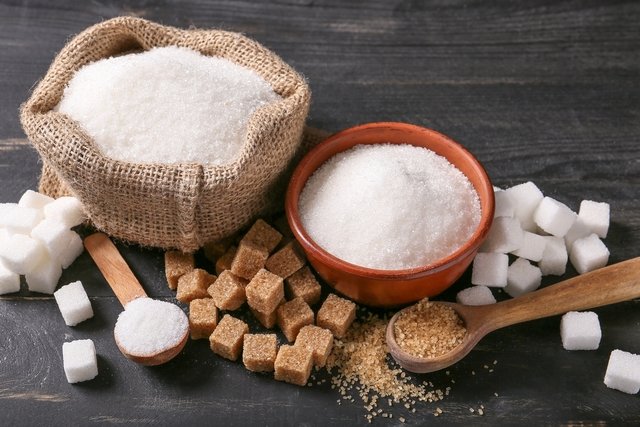Sugar has a high glycemic index and, therefore, excessive consumption of this ingredient increases blood glucose levels, hindering the production of the hormone insulin and causing harm such as insulin resistance and type 2 diabetes.
Furthermore, excessive sugar consumption is also linked to an increased risk of other diseases, such as obesity, cavities, fatty liver and cardiovascular diseases.
There are different types of sugar, such as refined sugar, brown sugar and demerara sugar, which can be added to juices and coffees, for example, or present in processed foods, such as soft drinks, ice cream and cakes.

Main harms of sugar
The main harms of excessive and regular sugar consumption to health are:
1. Obesity
As it is an ingredient rich in calories, excessive sugar consumption stimulates the production of fat cells that accumulate in the body, facilitating the gain of body fat and obesity. Learn about other causes of obesity.
Furthermore, the presence of sugar on the tongue and in the intestine stimulates the central nervous system, increasing the sensation of reward and may encourage the ingestion of more sugar.
2. Type 2 diabetes
Excessive sugar consumption increases blood glucose levels and gradually decreases the production of the hormone insulin in the body, thus causing insulin resistance and type 2 diabetes.
3. Fat in the liver
Sugar is an ingredient rich in fructose, a type of carbohydrate that is mainly digested by the liver. Therefore, excessive sugar consumption promotes inflammation and increases the formation of fat cells in this organ, causing fatty liver.
4. Cardiovascular diseases
Sugar consumption promotes high blood pressure, because it increases the levels of uric acid in the blood, a substance that inhibits the action of nitric oxide in the body. As nitric oxide helps relax blood vessels, balancing blood pressure, inhibition of this substance in the body can cause high blood pressure.
Furthermore, excessive sugar consumption can also cause inflammation in the blood vessels and increase triglyceride levels in the blood, favoring the emergence of diseases such as atherosclerosis, stroke or heart attack.
5. Cavities
Sugar promotes the growth and multiplication of bacteria in the mouth, which ferment this ingredient, changing the pH of the teeth and causing cavities. Learn about other causes of tooth decay.
6. Drop
Because it is rich in fructose, sugar promotes an increase in uric acid levels in the blood, which can cause gout, an inflammatory disease that affects the joints, generating symptoms such as swelling and pain when moving the joint. Understand better what gout is.
7. Dysbiosis
Sugar consumption can cause dysbiosis, an imbalance in the intestinal flora caused by an increase in the number of “bad” bacteria and a reduction in “good” bacteria in the intestine, which can weaken the immune system, increase gas production and cause diarrhea, for example .
Foods rich in sugar
Some examples of foods high in sugar are:
- Homemade desserts: cakes, puddings, jellies and sweets;
- Industrialized drinks: soft drinks, boxed juices and powdered juices;
- Industrialized sweets: chocolates, ice cream, gelatin, cookies, condensed milk;
- Ready sauces: ketchup, mustard, mayonnaise and salad dressings.
In addition to natural sugar, such as refined, brown or demerara, some processed foods may also contain artificial sugars, such as maltodextrin and sucrose. Therefore, it is important to always check the food label to check whether it contains sugar or not. See how to read food labels.
Recommended quantity
The World Health Organization recommends that daily sugar intake be less than 10% of the total caloric value of the diet. A person on a 2000 calorie diet should consume less than 50g of sugar per day, which is equivalent to 2 tablespoons of refined sugar, for example.
However, sugar intake below 5% of the total caloric value of the diet is indicated by the World Health Organization as being ideal for maintaining health and avoiding diseases.
How to reduce your sugar intake
To reduce sugar intake, you can initially choose to use natural sweeteners, such as stevia, xylitol and thaumatin to sweeten juices, coffees, natural yogurts, for example. Discover other natural sweeteners.
However, the ideal is to consume drinks and foods without added sugar or sweeteners. Therefore, one option to accustom your palate to the natural flavor of food is to gradually reduce the amount of sugar in your diet until you get used to it.

Sign up for our newsletter and stay up to date with exclusive news
that can transform your routine!
Warning: Undefined array key "title" in /home/storelat/public_html/wp-content/plugins/link-whisper-premium/templates/frontend/related-posts.php on line 12
Warning: Undefined array key "title_tag" in /home/storelat/public_html/wp-content/plugins/link-whisper-premium/templates/frontend/related-posts.php on line 13



